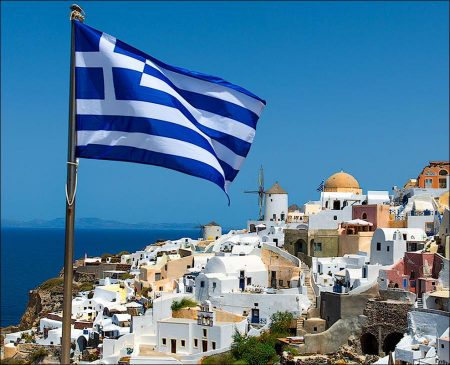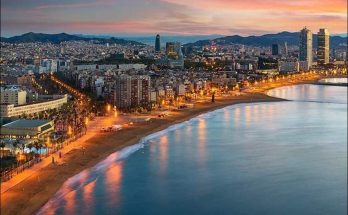It is great good fortune to spend a week in Corfu on the way to Greece. Seeing it from one end to the other, wandering through its olive forests and vineyards, brings on a mild, or, in some cases, a wild, intoxication without wine. What words fit the surrounding beauty but “Islands of the Blessed,” “Elysium,” “Garden of Eden,” “Paradise”? It is not Heaven, after all, for one sees here the poor, lame, blind, begging for small alms; but, as long as earth holds such corners as Corfu, it is not all cursed.
To the traveller who has felt the intoxication of such a region, and is impelled to report something of it, the impotence of words comes home with special force. Naught but the painter’s art seems adequate to report Corfu. And, furthermore, painter as well as poet might here well feel the weakness of his art. It is a great boon to have had this realm of beauty brought upon the retina of the eye, and so communicated to the soul.
One may, perhaps, be allowed to group the impressions that Corfu makes, and report them with a plainness that aspires only to the office of a photograph, resigning the attempt at coloring.
Before the eye lies one Corfu–the Corfu of today; but before the mind are brought two others-the Kerkyra of Greek history and the Scheria of Homer. The two latter compete with the former, and refuse the present beautiful scene a monopoly of attention.
The vegetation here is also Oriental — oranges, lemons, figs, forests of cactus and giant aloes abound. The four or five million olive-trees, many sixty feet high, are the characteristic features of the island. They form a beautiful background for the tall, dark-green cypresses. But the vine presses hard upon the olive. It is great good fortune to be here in the time of the grape harvest, even if one must miss the oranges and the olives. One day in September I walked to Palæokastritza, an old cloister on a rock looking out on the Ionian Sea, sixteen miles from the city. The way was through a continuous vineyard full of laborers. At this season of the year there is hardly a drop of running water in the island.
There are places where springs and brooks and even rivers have been and will be again, but there are none there now. The water in the wells and cisterns looks suspicious. But one has a substitute for water that is just about as cheap. For copper coin of the value of two cents a woman gave me a pile of grape clusters, enough for four men. On my return I managed to signify with my poor Greek to a man riding on a load of grapes that I would like to change places with him. For three miles I rode stretched out on the top of crates full of grapes, resting my tired feet, eating, by the permission of the driver, from the top of the crates, while from the bottom the precious juice oozed out and trickled into the dusty road. I felt that I was playing Dionysos. Then it was that the vintagers, many women and few men, came trooping picturesquely from the fields. They looked so happy that it seemed as if the contagion of joy rested in the vine. It seemed as if a touch of music would have converted them into a Dionysiac chorus.
If Corfu had no classical history, it would still be historically interesting. It has been spared that curse which rested so long on the rest of Greece-Turkish occupation. The Turks dashed their forces in vain in two memorable sieges against its rock forts. The high degree of culture here, as compared with the rest of Greece, outside of Athens, is partly due to this exemption. But there have been stimulating influences from without. Rome, Byzantium, Naples, Venice, and England have held sway here. The rule of Venice, to which the Corfiotes gave themselves voluntarily, as they had formerly done to Rome, lasted nearly six hundred years, with the interruption of the Anjou episode. This rule was mild and beneficent.
But, sweeping away the name of Corfu, which arose in the Middle Ages, and transferring ourselves back of all this foreign occupation and centuries of semi-barbarism, let us introduce ourselves to the Greek Kerkyra of Thucydides. Passing southward, a half a mile or so from the esplanade of the present city, one comes along an isthmus between two old harbors to an elevated peninsula, on which now stands the King’s villa in a beautiful garden. Here one is overpowered by historic associations. Here lay the proud Greek colony established by Corinth in 734 B.C., a colony that first set the example of filial ingratitude, and, feeling itself stronger than the mother city, joined battle with her and defeated her in the first great naval battle of Greeks against Greeks, in 665 B.C.
From this rising ground the eye dimly discerns in the distance, near the mainland opposite the southern end of the island, the Sybota Islands, where the later great naval battle between mother city and colony in the presence of an Athenian fleet gave the occasion for the dreadful Peloponnesian war. From this inner harbor, now abandoned and still, nearly silted up and yearly submitting to the encroachment of vines upon its borders, the proud fleet of Alcibiades and Nicias sailed for Syracuse. It was the alliance with Kerkyra, the key to the voyage to Sicily, that lured the Athenians to that ruin.
Little of this Kerkyra remains above ground. Perhaps much may yet be found below. About twelve years ago excavations by Carapanos laid bare a great quantity of terra-cottas. Perhaps it was a terra-cotta manufactory that he discovered. The ruins of an old Doric temple lie on the surface of the ground near a spring in an olive grove on the side of the peninsula looking toward the mainland.
The situation, 100 feet above the strait, among the olives and near an ancient fountain, makes one feel that he could have joined in doing honor to the dryads and naiads with the throng that used to meet here. One of the antiquarians of Corfu has lately advanced the view that these remains are those not of a temple but of a bath. Blessed bathers!
One need not linger too long over Kerkyra. It is a state which we cannot love. We cannot forget that before Salamis it held its fleet off the southern point of the Peloponnesus, waiting to see which way the great struggle was going to incline. When Athens concluded the alliance with her at the opening of the Peloponnesian war, many at Athens felt it to be an unholy alliance, and that the burden of hatred thus shouldered was almost a counterbalance to the winning of the second navy in Greece.
Views: 241



